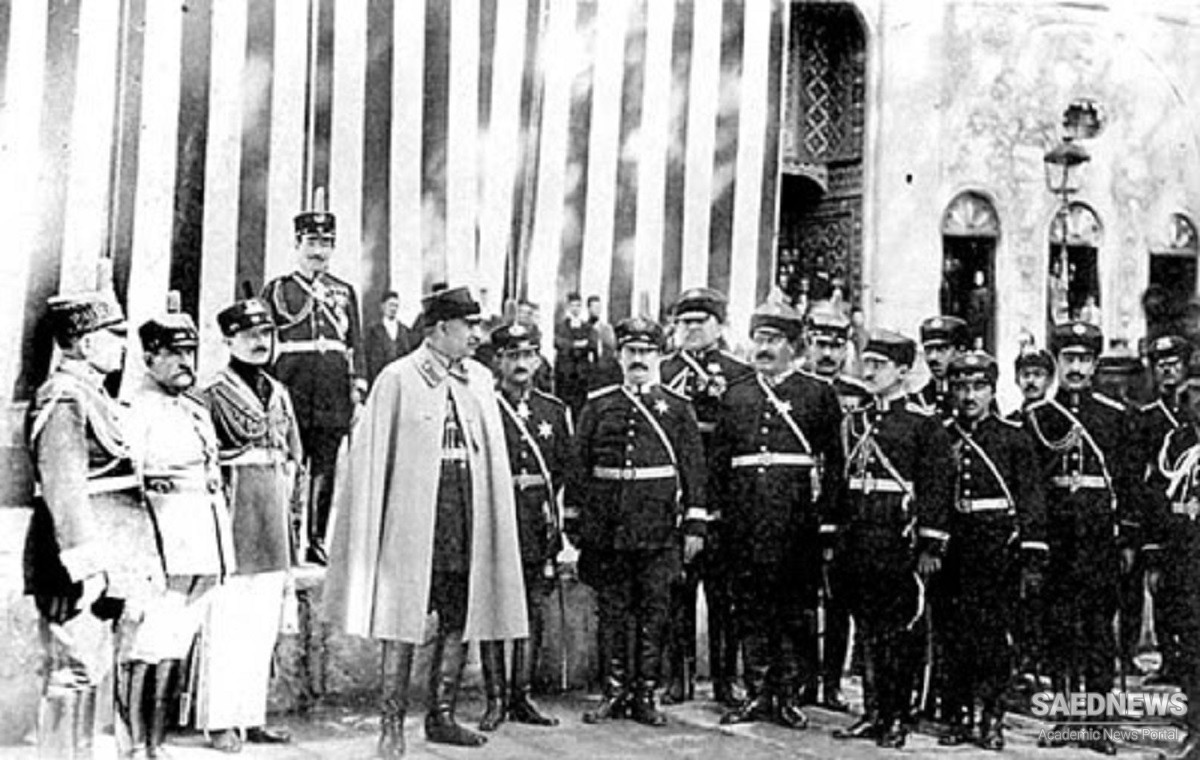But the tortured and interrupted existence of the Constitutional regime had lasted long enough to introduce new problems. The monarchy, which in the past had most often helped to hold the government together, had been somewhat discredited. Yet nationalism had also failed to act as a unifying force. In fact, it had introduced a new division along politico-ideological lines, between the Royalists and the Constitutionalists. Many members of the new elite came from the latter group, and when the war broke out some of them were active on the Iranian scene. The fact that Ahmad Shah was young and ineffective1 gave the emergent nationalist policy makers the opportunity to wield power, but whether their political ideology made it possible for them to govern remained to be seen.
Iran's international posture was no better when the war broke out than it had been earlier. Foreign intervention during the Constitutional period had been followed by Anglo-Russian manipulation of the Regent and the Cabinet after the destruction of the Second Majlis and during the postponement of the opening of the Third Majlis. In spite of the fact that Anglo-Russian friendship had cooled somewhat after the Russian understanding with Germany in regard to the Tehran-Khanaqin railway in 1911, the Anglo-Russian Agreement cd 1907 was still the basis of their position in Iran when the war broke out Furthermore, the Russian troops that had entered Iran in 1909 had remained there. In spite of this, soon after the outbreak of the war Iran announced a policy of strict neutrality in the farm&n of November 1, 1914.
The Shah, however, had little if anything, to do with the formulation of this policy. The real makers of the policy were some of the former Constitutional leaders: Mustawfî al-Mamälik, the Prime Minister, assisted by Mushir al-Dawlah and Mu*tamin al-Mulk. Prior to the adoption of this policy, which was declared before the outbreak of Russo-Turkish hostilities on Iranian soil, the Prime Minister first approached the Turkish Minister at Tehran inquiring whether his government would respect Iran’s policy of neutrality if it were officially declared. The answer was disappointing. The Minister stated that his government would like to do so, but that as Russian troops were stationed in Azerbaijan he could not see how Turkey could undertake and successfully implement an obligation to that effect. The Iranian government then approached the British and Russian Ministers, informing them that it intended to declare strict neutrality and implement it fully but that the presence of Russian forces in Azerbaijan might provide the Turks with a pretext for invading Iran. Hence Mustawfî al-Mamälik asked Russia to withdraw its troops from Iran. The British and Russian Ministers “appreciated” the Iranian views but inquired what guarantees could be given that after the withdrawal of Russian forces the Turks would not bring in theirs.* Later, the Russian Minister wrote the Iranian Foreign Minister that, inasmuch as only the Russian troops could maintain security for Russian and other foreign subjects, evacuation was "impossible at the time.”
Thus, despite the fact that prospects for the implementation of a policy of neutrality were bleak, the Iranian government decided to announce it to the world. Adoption of this policy and failure to execute it constitute the story of Iran's foreign policy during World War I. On October 29, 1914, the Breslau, a German ship then nominally under the Turkish flag, bombarded the Russian Black Sea port of Theodosia. Redress being refused, Russia declared war on the Porte. The Russo-Turkish hostilities thus touched off were bound to affect Iran, because the strategic aims and positions of the two belligerent powers clashed on Iranian soil. By the time Iran declared its policy of neutrality, Russia had brought in fresh forces and equipment to supplement those that had been in Azerbaijan since 1909 and had taken positions in Tabriz, Khoi, Daylaman, and Urumiyah * in order to outflank Turkey in case of war.
Turkey had acquired strategical points to the west of Lake Urumiyah, but had withdrawn its forces in 1912 when the first Balkan War broke out.6 When Kurdish tribesmen crossed the Iranian border pushing toward Urumiyah in September 1914, Turkish soldiers reappeared on Iranian soil.7 Then when Turkey entered the war on the side of the Central Powers, Turkish troops poured in from the Bazargan frontier advancing toward Urumiyah, and from the Baneh frontier advancing toward Sauj Bulagh. This Turkish advance created a new front for Russia and was favored by Germany, because it would divert Russian energies from the main theater of war in Europe.
Both Germany and Turkey hoped to achieve political objectives also. The Turkish advance in the east was to pave the way for the extension of German influence to the Middle East and finally to India. Turkey, on the other hand, launched its advance in the east in the hope of achieving Pan-Islamic and Pan-Turanian objectives. The former aimed at the revival of the authority of the Caliphate over all Muslims; the latter aimed at the liberation and absorption of the Turkish-inhabited areas, such as Azerbaijan. The Turkish advance toward Tabriz turned Azerbaijan into a Russo-Turkish theater of war. This province suffered from all the vicissitudes of the war on the eastern Anatolian front and was gravely affected after the Russian Revolution.


 Imam Khomeini on Colonialism and Satanic Hegemony of Devil
Imam Khomeini on Colonialism and Satanic Hegemony of Devil














































